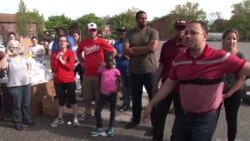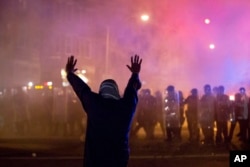In Baltimore, Maryland, a better future depends on improvements to the local economy, education, job training, housing, policing and more, stakeholders say.
Officials, businesses and residents are looking toward solutions to uplift the entire city after last month’s demonstrations and rioting damaged some neighborhoods and slowed commerce throughout the area. The federal Small Business Association this week estimated an initial $8.9 million in damages to approximately 285 commercial enterprises and two houses, according to The Baltimore Sun. The Baltimore Development Corp. said the impact was even greater, with riots and looting affecting 351 businesses.
Angry residents took to the streets in the predominately African-American city following the April 19 death of Freddie Gray, a 25-year-old black man who suffered fatal injuries a week earlier while in police custody. Six police officers, including three African-Americans, face criminal charges in connection with his death.
Compounding problems
The riots compounded problems in the West Baltimore neighborhood of Sandtown-Winchester/Harlem Park, where Gray grew up. Police are still fighting high crime rates, and nearly every corner shows signs of economic despair. Roughly 23 percent of black men are unemployed, according to the U.S. Labor Department.
Maryland state lawmaker Antonio Hayes – who represents the 40th District, including Sandtown – says people here want a better Baltimore.
"Being better means seeing justice in our criminal justice system, having better opportunities for fair housing and, you know, having better wages," Hayes said.
Securing more jobs for blacks is key to the city’s future success, says Bronwyn Mayden, a Baltimore native and assistant dean of the University of Maryland School of Social Work.
"We also need people [who] are ready to be trained for jobs," Mayden said. "And right now in this community, we have a lot of issues where we need to work on getting people ready to be able to hold onto jobs."
Education is foundation
They need a solid education first, she said. In the Sandtown area, one out of four adults lacks even a high school diploma, according to the Baltimore Neighborhood Indicators Alliance.
Resident Brittany Davis blames city officials for not making educational investments in black neighborhoods.
She accused Mayor Stephanie Rawlings-Blake of favoring other parts of the city. “She has taken away our taxpayers' money and given it to a builder downtown to build condos, but our schools are lacking resources that they need for our children," Davis said.
But even significant investment has not alleviated the poverty, crime and rundown housing in some heavily black parts of Baltimore. For instance, a $130 million infusion for affordable housing in Sandtown, Gray's neighborhood, made little difference over a 20-year period, The Washington Post recently reported.
Mending frayed police-community ties
Community leaders say regaining trust with the police is also essential to moving the city forward.
"You have to be engaged with the folks that you are sworn to protect and serve," said Rob Weinhold, a former Baltimore City police officer who now runs a crisis management firm. An officer must understand "what the core issues are so you can, as a public servant, figure out how to be a terrific convener, facilitator and problem solver to improve the quality of life."
Linda Kees dreams of a better quality of life for herself, her husband and three daughters. She wants police to do more to fight crime in the neighborhood.
"I hope they really build the community up like they [city officials] say they will," Kees said. "With that being said, I will do everything in my power to help. I do not have a problem going from door to door asking anybody if they want to help."
She and others believe positive change can happen with a greater investment in the community and the people who live here.
On Wednesday, the Baltimore Development Corp. announced it was trying to raise $15 million for a loan fund to speed the recovery of businesses damaged by rioting, the Baltimore Business Journal reported. Once it reaches that amount, loans of up to $35,000 would be available to affected businesses at no interest.






